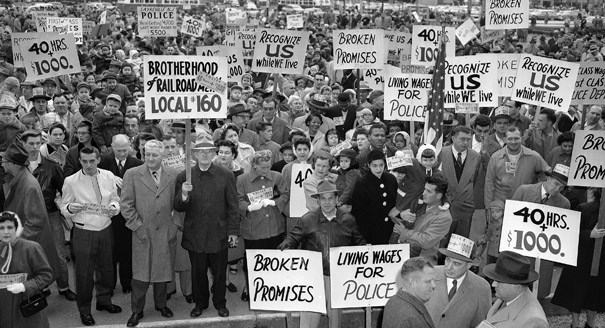This article was produced by the Independent Media Institute.
The guard shacks, razor-wire fences and gun-toting soldiers struck fear into Cynthia Overby when she traveled with an American university group behind the Iron Curtain in 1971.
Even worse was the utter despair she witnessed in people living under the weight of authoritarianism, a memory that inspired her lifelong commitment to safeguarding liberty at home.
Millions of Overby’s union siblings join her in that battle every day. Union members stand on the front lines of democracy and guard America’s freedoms with the same solidarity and collective power they wield in the workplace.
“Democracy is fragile,” observed Overby, a member of the Steelworkers Organization of Active Retirees (SOAR) Chapter 7-34-2 in Granite City, Illinois, noting that Russia’s attack on Ukrainian democracy reminds her of the devastation and misery wrought by other repressive regimes.
“We saw statues of Stalin,” she said of her visit to the former East bloc many years ago. “We saw people living in poverty. We saw oppression, and people didn’t smile. I’ve never forgotten that. I don’t want to live that way.”
Union members and retirees like Overby are accustomed to electing union leaders, voting on contracts and having a voice on the job, and that also makes them fierce advocates for government by the people.
They circulate petitions for pro-worker candidates, then make thousands of phone calls, send out thousands of postcards and knock on countless doors to get those people elected. They turn out the vote on Election Day, often offering to drive neighbors to the polls or serving as precinct election workers to ensure efficient, convenient balloting.
There’s no denying that this advocacy protects Americans’ freedoms.
According to a recent report by the Economic Policy Institute, the higher a state’s union density, the less likely legislators have been to push through restrictive voting laws. On the other hand, the report found, more than 70 percent of states with low numbers of union members mounted at least one successful attack on voting rights between 2011 and 2019.
In addition, a 2020 study by Tova Wang, a visiting democracy fellow at Harvard’s Ash Center for Democratic Governance and Innovation, observed that unions increase voter turnout rates, both among members and “people around them.” The study noted that “unions have often been referred to as ‘schools of democracy’” because they nurture the collective decision-making and other experiences that “one needs to be an active and effective participant in electoral politics.”
Yet fighting for democracy involves more than voting. Union members, who take pride in contracts that fight discrimination and narrow wage disparities for women and workers of color, regularly wage battles for social justice and human dignity in state capitals and Washington, D.C.
Tireless advocacy by the USW and other unions—along with the work of retiree groups like Overby’s SOAR chapter—led Congress to pass legislation last year saving the pensions of more than 1 million workers and retirees in failing multiemployer plans.
And the USW, SOAR and its many allies achieved another victory a few months ago, when President Joe Biden signed legislation that not only makes $1.2 trillion in overdue investments to America’s infrastructure but also helps ensure that union workers supply the materials, parts and components needed for those projects.
The democratic process “touches your life constantly,” said Overby, noting she and other activists recently collaborated with Illinois state Representative Katie Stuart to make hygiene products more accessible to underprivileged women.
Union members gather in huge numbers for rallies calling for affordable health care, workplace safety, stronger labor rights and Social Security protections. They march and walk picket lines to call out employers’ abuses. These actions generate solidarity and get decision-makers’ attention.
“If I come up to the plant gate alone, they’d laugh at me. Come with 600 people, and it’s a different story,” explained Ken Yatsko, president of SOAR Chapter 7-1 in Gary, Indiana.
Yatsko spent decades as a union officer and activist, fighting for justice at his workplace and many others.
But never did he feel more energized than on the day several years ago when he and hundreds of other union members and retirees marched five blocks to the U.S. Steel plant in Gary, delivering a message of strength and solidarity during the push for a fair contract. Yatsko walked at the head of the column, carrying a SOAR banner, and remembers seeing plant security startled by the size of the crowd.
“That was one of the greatest moments of my union life,” he said.
Union members will never stop fighting to improve average Americans’ lives and defend their freedoms.
Overby’s SOAR chapter, for example, holds an annual scholarship contest for local high school students. To be considered this year, applicants must write essays on voting rights, a topic intended to help the youths grasp a pivotal issue affecting America’s future.
After retiring, Yatsko told his wife he planned to take a break from political activism and union activity. But only a short time later, he was back at it.
“If we don’t do these things, we’re going to lose our voice,” he said. “We have to keep up the fight and stick together.”
Tom Conway is the international president of the United Steelworkers Union (USW).
Related posts:
Views: 0
 RSS Feed
RSS Feed

















 March 10th, 2022
March 10th, 2022  Awake Goy
Awake Goy 

 Posted in
Posted in  Tags:
Tags: 
















